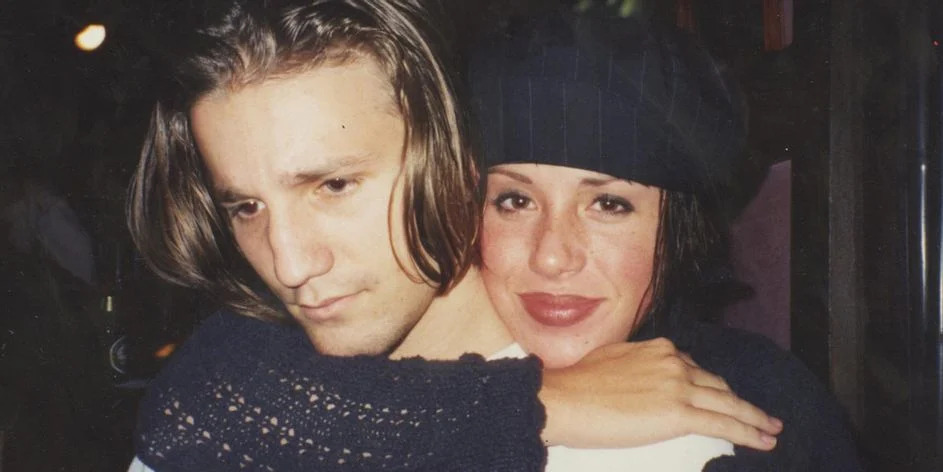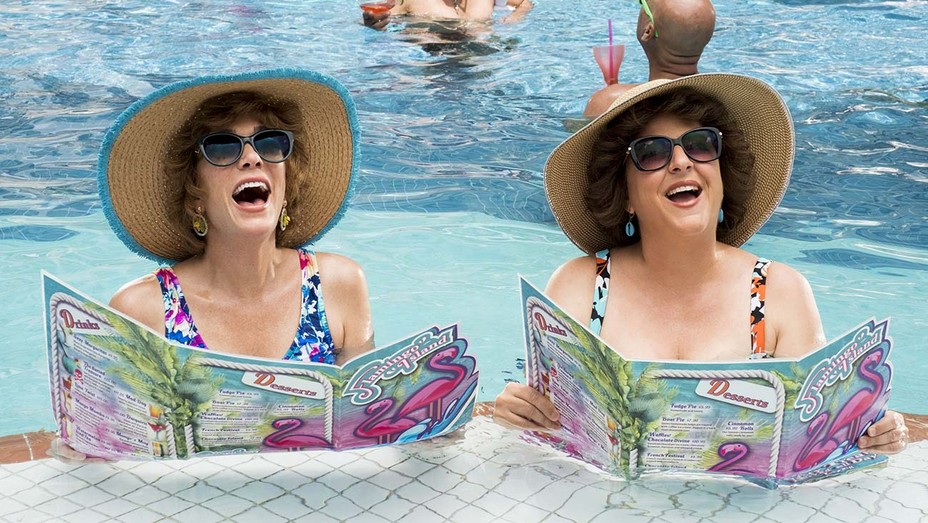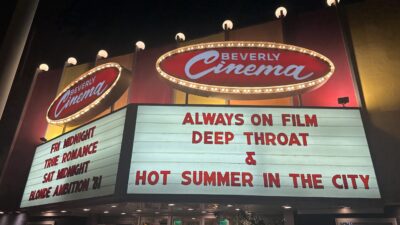Join us in the Patreon-funded time machine as we zip back to the Clinton presidency and evaluate how and why the values of the ‘90s are seeping back into 2021’s cultural consciousness with reviews of Soleil Moon Frye’s autobiographical KID 90 and Film Twitter’s latest comedy obsession, BARB AND STAR GO TO VISTA DEL MAR.

KID 90
Director: Soleil Moon Frye
I’ve spent quite a lot of time going through artifacts from my 1990s childhood left in forgotten drawers at my parents’ house during the pandemic, rifling through photographs and unfiltered diary entries about the cast of Real World and how much I loved Dunkaroos. There’s objectively no depth or societal analysis to be had in this, just nostalgia: the potency reserved for myself, the one who experienced it all first-hand. While I could pick up on the subtext of an argument I had with my mom, or psychoanalyze my obsession with Ginger Spice, an observer would merely shrug. Soleil Moon Frye is a newly minted documentarian with KID 90, an exclusive look at her teenage years that, like a fossilized inside joke from high school, is probably only enjoyable to those that were there at the time.
Available on Hulu, KID 90 leans hard into its nostalgia factor, its narrative so esoterically within Frye’s introspective world (with input from friends Mark-Paul Gosselaar, David Arquette, and Brian Austin Green) that unless you’re a ravenous fan, you’ll be left with little to chew on. We see her famous friends cameo on camcorder footage of house parties and old voicemails, from those who have since struggled to “make it” to Leonardo DiCaprio and Mark Wahlberg. These archival Easter eggs are the high points in an otherwise messy, indulgent journey through teenage reveries. I spent a fair amount of time trying to understand the context of why I was even watching this. Most people under 35 haven’t heard of Frye unless you spent time watching VH1’s I LOVE THE 80s/90s series from 15 years ago. She and her peers are icons of contemporary child stardom, and while it’s clear Frye’s goal was to bring the audience backstage and explore what this sort of celebrity experience meant, she never actually answers this. Frye’s bright personality and her treasure trove of archives make for an impressive dossier of the celebrity set’s teenage years during the Clinton era. Frye and her subjects do a wonderful job capturing the honesty of drug use and portray teenage partying with a refreshingly objective eye, also carefully depicting the likes of Justin Pierce and Sean Caracena as humanist, careful to not sensationalize their lives, nor the lives of other friends tragically lost early to a hard-and-fast lifestyle. Yet it’s this peacemaker approach and choice to not draw conclusions that exacerbate the film’s flaws. What we are left with is a vibe.
For someone like an incredibly privileged Frye, it makes the “so what” of it all even more of an unnerving itch left unscratched. It’s particularly felt when Frye reflects upon her move to New York City at the age of 18. Watching her New York years felt akin to someone making you flip through their Facebook photos from freshman year dorm life when you have zero relationship to them or their college. Yes, she got to know Justin Pierce and several of the individuals from Larry Clark’s KIDS, but beyond her footage of partying with them, KID 90 is glomming onto a cultural moment. [Hilary Jane Smith]

BARB AND STAR GO TO VISTA DEL MAR
Director: Josh Greenbaum
The word of mouth “hit” BARB AND STAR GO TO VISTA DEL MAR has likely already made its way across your timeline in one form or another, partly because of what a dry spell ‘rona has forced the industry into and partly because comedy tastemakers have championed the film as an instant cult classic in the vein of Kristen Wiig and Annie Mumolo’s previous movie, BRIDESMAIDS. Like that surprise hit, Wiig and Mumolo use the BARB AND STAR script to explore the root of female friendship in turmoil with a cast of comedy who’s whos. Musical numbers, slapstick pratfalls, goofy talkarounds, and talking animals fill a loose 107 minutes wherein the titular Barb and Star vacation in (you guessed it) Vista Del Mar only to get caught up in a wacky caper that balances an evil genius attempting to unleash lethal bugs on the beach town and a three-way love triangle involving FIFTY SHADES OF GREY hunk Jamie Dornan.
Wiig and Mumolo’s latest is built to be bright, colorful, and fun in a way that feels largely impenetrable to criticism—the kind of film that the “let people like things!” crowd would’ve had a field day over had that negativity ever manifested. It’s easy to get swept up in the insanity of BARB AND STAR; Reba cameoing as a mermaid (sea ghost? water spirit?), an insane remix of Céline Dion’s “My Heart Will Go On,” Wiig playing both the hero and the villain, a healthy dose of Midwestern accents… It’s everything but the kitchen sink, and it makes sense that an entire generation stuck in a state of arrested development has rallied around the film. Roughly a full calendar year into a quarantine period that’s seen every pop culture touchstone from the last 30 years find a brief moment in the sun, it’s not particularly surprising that the ‘90s comedy sensibilities have struck a nerve, but I’m not particularly sure that makes it great either. From AUSTIN POWERS to ZOOLANDER to (maybe? I guess?) THE MASTER OF DISGUISE, a kind of dated, mind-melting energy defines the movie in ways that could be validly conceived as either annoying or fresh.
And look: BARB AND STAR’s tonal exploration is interesting as a thought experiment on what pre-9/11 comedies felt like, and if that’s the intended goal then consider me all in, but I’m weary that one of the first film wins seen in the Biden era is trying to force-feed us jokes that are so purposely corny and detached that they recall the end of the Clinton years. To Wiig, Mumolo, and director Josh Greenbaum’s credit, they’ve implemented a smart, mile-a-minute pace to the jokes here, but if what they’ve created is a new wave that other studio comedies are going to attempt to replicate, I’m out. At one point we’re introduced to a talking crab named “Morgan Freemond,” voiced by a Morgan Freeman soundalike. You’re really either all in or all out on this thing, and I certainly can’t fault anyone for either hating or falling for its dated charm. Regardless of if you love or hate it, I think we can agree we don’t need more of it. [CJ Simonson]
















Comments